Q&A: Students Share Their Experiences Learning and Making an Impact with the Nonprofit Board Fellows Program

Every year, graduate students join forces with Business+Impact at Michigan Ross to learn what it takes to serve on a nonprofit board as part of the Nonprofit Board Fellows program.
This year, students from Ross, Ford School of Public Policy, School of Social Work, Public Health, and many other areas honed their project management and executive skills as board members for nonprofit organizations in Southeast Michigan. As part of their project, students attended all of their nonprofit’s board meetings, served on a board committee, worked on a board-level project tackling a complex organizational challenge, and attended the Board Fellows Forum in March.
We interviewed a few of our board fellows to learn more about their personal experiences with the program.
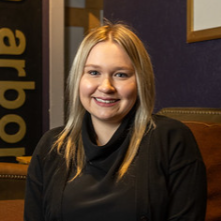 Lillian Brandt, MAcc ’23
Lillian Brandt, MAcc ’23
Organization: Ann Arbor Civic Theatre
Location: Ann Arbor, MI
Describe the project you have worked on with the organization, and how did it further the organization’s mission?
The project I worked on with Ann Arbor Civic Theater utilized my accounting skills as a MAcc student at Michigan Ross. The project’s overall goal was to help simplify the play selection process using financial measurements and an overall organization of financial statements.
What is the biggest thing you’ve learned from the Board Fellowship experience; what skill have you developed?
I utilized the knowledge I learned in the classroom with real-world applications. All the tax information I can apply to an organization and the usage of Excel has further expanded my skills on the topic.
What impact will this experience have on your future plans?
This experience has enriched my knowledge about nonprofits, which was close to none at the start of this project. Knowing that most nonprofits look for individuals with financial background experience to help serve their boards has made me look for opportunities to join a nonprofit board in the future as one of my goals.
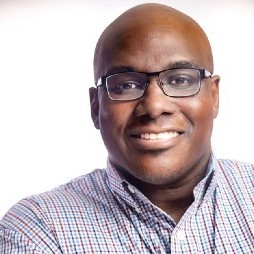 Dwayne McFarlane, MBA/MSI ’24
Dwayne McFarlane, MBA/MSI ’24
Organization: Library of the Great Lakes
Location: Ann Arbor, MI
Describe the project you have worked on with the organization, and how did it further the organization’s mission?
When I first onboarded with my nonprofit organization, The Library of the Great Lakes, I did so with the intention of designing and implementing a management database system as my fellowship project. However, after attending our annual retreat, it became clear that a pivoting toward a service design – research-based UX project – would be most beneficial in helping the organization clarify and realize its strategic goals.
What is the biggest thing you’ve learned from the Board Fellowship experience; what skill have you developed?
What I take away from this experience is a sharpened ability to deeply understand the cohesive vision of the board even if it was not explicitly stated. This was done by listening intently and building connections via correlating ideas/themes.
Do you have advice for future board fellows?
Remember to draw from the totality of your life experiences and skills when determining the best way that you can make the greatest impact at your nonprofit organization. It may be a skill that you’ve learned during your time at Ross or trade you honed years ago.
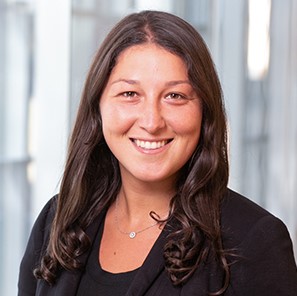 Jamie Morgenstern, MBA ’24
Jamie Morgenstern, MBA ’24
Organization: SOS Community Services
Location: Ypsilanti, MI
Describe the project you have worked on with the organization, and how did it further the organization’s mission?
I have learned that there is a true shared desire to pay it forward and do good for your community. There are people involved in my nonprofit who live very busy lives, hold important jobs and are raising families. Despite the scarcity of free time, these people put aside time each week to give something back. This is a quality that should be stressed in schools, organizations and elsewhere to ensure that important work is done, and to share what brings us together rather than what separates us.
What impact will this experience have on your future plans?
In the future I hope to continue working with nonprofits to share what I have learned about business, organizations, and fundraising. I want to spend time volunteering and making a difference in any community I am a member of.
Do you have advice for future board fellows?
My advice for future board fellows is to start slow, learn about the mission and the talents and expectations of your fellow board members. It is important to listen, to learn, and then to add your perspective. That said, do not be shy in sharing your ideas and input. Your perspective or life experience might be somewhat unique, so share your ideas and your views. Just make sure you do so respectfully and with an eye towards contributing something meaningful to the endeavor.
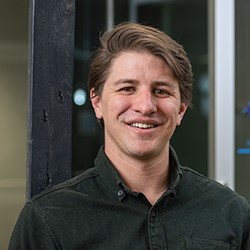 Zach Nerod, MBA/MS ’24
Zach Nerod, MBA/MS ’24
Organization: Washtenaw Housing Alliance
Location: Ann Arbor, MI
Describe the project you have worked on with the organization, and how did it further the organization’s mission?
I have helped WHA implement a new set of development guidelines for board members, find and choose a new CRM software for tracking donations, and created a new calendar to structure their development activities. Each of these are central to WHA’s long term development success, and the development guidelines are especially important. These guidelines will help make being a board member more accessible for WHA constituents and will give clarity to current members as to ways they can help achieve WHA’s development goals.
What is the biggest thing you’ve learned from the Board Fellowship experience; what skill have you developed?
My biggest takeaway from my experience has been how necessary providing structure to an organization’s development activities is. I am not someone who instinctively creates structure, so this lesson has been particularly salient for me. To that end, I have really developed that skill as well; I feel I am better able to convey expectations and set up processes more than I was back in September.
What have you learned from attending your nonprofit’s board meetings?
I have seen firsthand how important board member engagement is. WHA’s board is a great asset to the organization and each member provides fantastic insight and direction with their questions and contributions. I have been really impressed by how collaborative and supportive the board is, and how committed each member is to WHA’s mission.
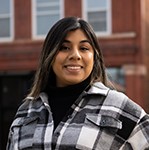 Alexia Carrillo Villalobos, MPP ’23
Alexia Carrillo Villalobos, MPP ’23
Organization: A Brighter Way
Location: Ypsilanti, MI
Describe the project you have worked on with the organization, and how did it further the organization’s mission?
I am currently working on the On-Boarding Project which is a process for their board members when hired. A Brighter Way is currently in a period of growth. In order to sustain and continue it, they needed to expand systems and standard operating procedures. The approach to this is to further continue the mission in identifying potential board members, through an approach of finding individuals with diverse experiences and backgrounds to represent the community they are serving – returning citizens.
What is the biggest thing you’ve learned from the Board Fellowship experience; what skill have you developed?
This opportunity has allowed me to take a step into the process of people who shape the organization, board members. They play a huge role in development, commitment, and advocacy. The On-Boarding project has given me skills in making sure when board members are hired, they have a smooth transition on the key things needed to adapt into the organization.
Do you have advice for future board fellows?
My advice would be, it’s okay not to know everything. This is an opportunity to grow and I do believe we are always learning and growing. Allow yourself to get out of your comfort zone and challenge yourself in ways you can to improve either skills or knowledge. Lastly, don’t be afraid to ask questions and communicate your needs to have a better working environment not just for yourself but your advisors.







